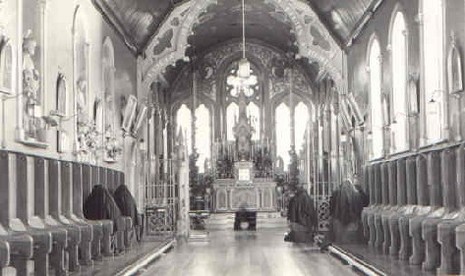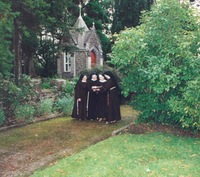From a new found friend in Ireland
 I just received this grand letter (in the form of a comment) from Eamonn Giblin, a native of Drumshanbo, County Leitrim, Ireland, a place dear to my heart. I’m sure that Mr. Giblin will not object to my sharing his reminiscences with the readers of Vultus Christi. My own Dad, and my Irish friends, John and Elizabeth Flynn, Sisters Joseph, Helen, and Mary (R.S.M.), Father Bernard Healy, Sean and Bridie Canning, Ailish Melia, Pauline Burke, Marion Mulhall, and many others will be especially pleased to read this. Father Dan O‘Leary, you’ll enjoy this too. Reverend Mother Angela (current Abbess of Drumshanbo) won’t be able to read this online, but I know she’ll hear about it!
I just received this grand letter (in the form of a comment) from Eamonn Giblin, a native of Drumshanbo, County Leitrim, Ireland, a place dear to my heart. I’m sure that Mr. Giblin will not object to my sharing his reminiscences with the readers of Vultus Christi. My own Dad, and my Irish friends, John and Elizabeth Flynn, Sisters Joseph, Helen, and Mary (R.S.M.), Father Bernard Healy, Sean and Bridie Canning, Ailish Melia, Pauline Burke, Marion Mulhall, and many others will be especially pleased to read this. Father Dan O‘Leary, you’ll enjoy this too. Reverend Mother Angela (current Abbess of Drumshanbo) won’t be able to read this online, but I know she’ll hear about it!
I’m from Drumshanbo, Co’ Leitrim – born in 1944. Now aged 66, I served the 07:30 mass in this convent from age 7 through 12. It was then an enclosed order of perpetual adoration of the Franciscan nuns. It is now run by the Poor Clare order. In all the time I knew them, I never met any of the nuns face-to-face – all communications were conducted through a curtained grille and, if any vestments or altar fitments were required, they were provided to me via a turntable beside the grille. The innocence of the ladies with whom I dealt “shone” through – even as I child, I wondered at the lack of worldliness and the “simplicity” of those beautiful people.
We had some winters that were only awful, but I never missed a single mass, whatever the weather – it was a long mile from my home and it was strictly “shank’s mare” for transportation. You cannot imagine how fabulous a simple cup of tea and a biscuit tasted after mass on some of those inclement mornings – all delivered, naturally, via the ubiquitous turntable.
Should anyone in any house in the vicinity of Drumshanbo fall seriously ill or should any farm animal be in trouble, more reliance was placed in the nuns “storming of heaven” with prayer during their vigils than was ever placed on the local doctor or vet.
My lady sacristan, whose name (I am ashamed to say) I cannot bring to mind once asked me if there really were people inside that silver thing that some of her sisters had seen in the sky – how could it be so. Remember that these folks had cloistered themselves into isolation – no newspapers, no radio, no visitors from the outside world except for one family visit per annum. They completely abandoned the world for a life of penitence and adoration.
I had the honour to serve mass at the funeral of my lady sacristan – she was 86 years of age and had been inside the convent since about the age of 14. Sadly, on inclement mornings thereafter, the tea and biscuit custom did not pass on from her to her successor.I visited the convent in the mid ’90s – I was making a trip of nostalgia and, believe you me, it was with great sadness that I observed that the community had dwindled in numbers to almost nothing – those there were now all “well-on” in years and vocations had dried up. To a layman, the most noticeable evidence of this was the “lightness” and “reediness” of the chanted vespers when compared with it’s former glory days.
I don’t quite know just how or why I came across your article – I was actually browsing for the words of Joseph Mary Plunkett’s Easter Rising 1916 poem – “I see His blood upon the rose” – for a CD/DVD I’m making for my sister’s birthday and somehow I stumbled into your site. The trip that resulted down memory lane has been extraordinary and, I have to confess, I’ve thoroughly enjoyed it. Thank you for taking the time to read my musings – I can only hope they didn’t “bore the socks” off you – anyway, I’m fairly sure you would be much too polite to tell me even if it were so.
 And I’m sure that Eamonn and others will be interested in hearing of the graces received in Drumshanbo by the Reverend Mother St. Joseph, the second abbess of the Convent. June 11th was the 131th anniversary of the death of the saintly Reverend Mother St. Joseph, Drumshanbo’s second abbess; Our Lord called her to Himself on the eve of Corpus Christ, 11 June, 1879. On one occasion, speaking in a rapture of Divine Love, Mother St. Joseph said to a witness:
And I’m sure that Eamonn and others will be interested in hearing of the graces received in Drumshanbo by the Reverend Mother St. Joseph, the second abbess of the Convent. June 11th was the 131th anniversary of the death of the saintly Reverend Mother St. Joseph, Drumshanbo’s second abbess; Our Lord called her to Himself on the eve of Corpus Christ, 11 June, 1879. On one occasion, speaking in a rapture of Divine Love, Mother St. Joseph said to a witness:
. . . that Our Divine Lord wished the Devotion to the Most Blessed Sacrament to be increased over the whole world; that we were to have Perpetual Adoration and Exposition of the Most Blessed Sacrament in our Convent Chapel; that we should be the Adorers to keep watch, hour by hour, day and night, before the Most Holy; that a high Tower should be built, and that the Bell should toll every hour, one, two, three; and that men’s hearts should be touched thereby; that ladies would furnish the pecuniary aid necessary for the Perpetual Adoration which implied Exposition. She also told me that our Constitutions brought from France should be revised and sent to Rome. . . .
Our Divine Lord also spoke about the Churches of Ireland — that poverty prevented the Blessed Sacrament being reserved in the Tabernacle [in many cases]; but He wished His priests to be zealous for the adornment of the Sanctuary, and that they would thus minister to Him personally. No heed should be paid to those who murmured against what they would term ‘this waste,’ as the Pharisees had murmured that the price of the precious ointment was not given to the poor — adding that the multitude see and compassionate the wants of the Poor, but the enlightened soul of the consecrated spouse best discovers the needs of her Lord!
Our Divine Lord again made know to our dear Mother St. Joseph that great blessings would descend upon our country through means of Devotion to the Most Blessed Sacrament — that external demonstrations and the decoration of Churches honoured Him, and that even regal honours should be paid Him as a King upon His Throne in the Sacrament of His Love; . . . that the Jews would be converted and acknowledge Our Lord in the Most Blessed Sacrament to be their King and their God.
With Mother St. Joseph interceding for the Church in Ireland from her place in heaven, and her faithful daughters, though now they be few in number and rich in years, praying before the Most Blessed Sacrament in their chapel in Leitrim, one has reason to rejoice in hope, even when, from a human perspective, everything there seems to point to an alarming crisis of faith.

Warm greetings from your Irish friends Father Mark, you are also very dear to us.
Peace be with you! What a gift to be led to your post here today, to read the beautiful words from Mother St. Joseph.
My Dad’s Leitrim ancestors made their home on Sliabh an Iarainn Mountain. During the Catholic persecution I believe they would have received the Eucharist at a Mass Rock between Ballinamore and Drumshambo. It makes me very happy now to learn that there is a convent nearby and perpetual Adoration of Our Lord. From America I will pray in union with the Sisters there.
Our Lady, Queen of Martyrs, pray for us!
God bless you all during Holy Week and Eastertide.